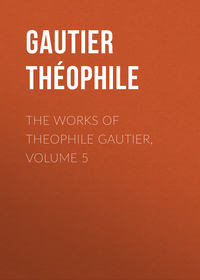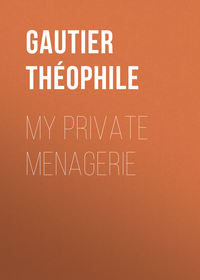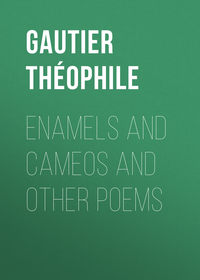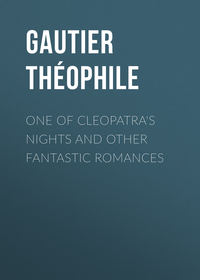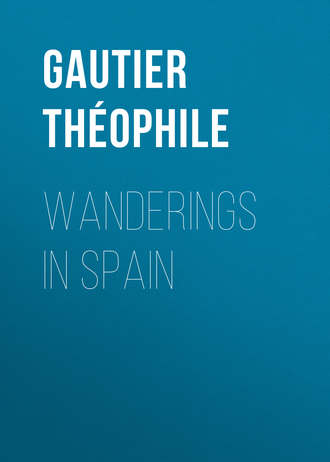 полная версия
полная версияWanderings in Spain
In one of the corridors is placed a white marble Christ the size of life, attributed to Benvenuto Cellini, and some very singular fantastic paintings in the style of the Temptations of Callot and Teniers, only much older. In other respects it is impossible to conceive anything more monotonous than these narrow, low, and interminable corridors of grey granite, which circulate all through the edifice like the veins in the human body; you must really be blind to find your way about them; you go up stairs and down stairs, you make a thousand twistings and turnings, and if you only walked about three or four hours you would wear out the soles of your shoes, for the granite is as rough as a file, and as harsh as so much sand-paper. From the dome you perceive that the balls which, when viewed from below, did not appear larger than horses' bells, are of an enormous size, and might serve as monster globes. An immense panorama unfolds itself at your feet, and you perceive at one glance the hilly country which separates you from Madrid; on the other side you behold the mountains of Guadarrama. From this position, too, you see the whole plan of the building; your eye plunges into the courtyards and cloisters, with their rows of superposed arcades, and their fountain or central pavilion; the roofs appear like so many simple ridges, just as they would in an engraving that gave a bird's-eye view of the place.
When we ascended to the dome, a stork with three little ones was perched in a large straw nest, that resembled a turban turned upside down, placed on the top of one of the chimneys. This interesting family presented the strangest appearance in the world; the mother was standing on one leg in the middle of the nest, with her neck stuck between her shoulders, and her beak reposing majestically upon her breast, like a philosopher in meditation; the little birds were stretching out their long beaks and their long necks to ask for food. I hoped to witness one of those sentimental scenes of natural history, where we see the large white pelican wounding her own breast to nourish her offspring; but the stork appeared to be very little moved by these demonstrations of hunger, and did not move more than the stork engraved on wood which adorns the frontispiece of the books coloured by Cramoisi. This melancholy group increased still more the profound solitude of the place, and imparted a kind of Egyptian character to this Pharaoh-like assemblage of buildings. After descending from the dome, we visited the garden, where there is more architecture than vegetation. It consists of a succession of large terraces and parterres of clipped boxwood, representing a series of designs similar to the patterns of old damask silk, with a few fountains, and pieces of greenish water; it is a wearisome, solemn garden, as formal as a Golilla, and altogether worthy of the morose-looking edifice to which it is attached.
There are said to be one thousand one hundred and ten windows in the exterior of the Escurial alone, a fact which greatly astonishes the cockney visitor. I did not count them, as I preferred believing the report to entering upon an undertaking of such magnitude; but the fact is not improbable, for I never saw so many windows in one place; the number of the doors is equally fabulous.
I took leave of this desert of granite, this monastic necropolis, with an extraordinary feeling of satisfaction and delight; it seemed as if I were restored to life, and that I could once more feel young, and enjoy the wonderful creation of God, which I had lost all hope of doing, while under these funereal vaults. The warm bright air enveloped me as with some soft cloth of fine wool, and warmed my body, that was frozen by the cadaverous atmosphere; I was freed from the architectural nightmare, which I thought would never end. I would advise those people who are absurd enough to pretend that they are suffering from ennui to go and pass three or four days in the Escurial; they will there learn what ennui really means, and, for the rest of their lives, will always find a fund of amusement in the thought that they might be in the Escurial, and that they are not.
When we returned to Madrid, all our acquaintances were astonished and delighted at beholding us once more alive. Very few persons return from the Escurial; they either die of consumption in two or three days, or blow out their brains, – that is, if they are Englishmen. Luckily, we both enjoy a very good constitution; and as Napoleon said of the cannon-ball which was to carry him off, the building that is to kill us is not yet built. Another thing which did not cause less surprise was the fact of our bringing our watches back with us; for in Spain there are always, on the high-road, persons extremely desirous of knowing what o'clock it is; and as there are neither clocks nor even sundials at hand, they are under the painful necessity of consulting travellers' watches.
Talking of robbers, I may as well seize this opportunity of narrating an adventure in which we nearly sustained two of the principal parts. The diligence from Madrid to Seville, by which we should have gone, but from the fact of there being no more room, was stopped in the province of La Mancha by a band of insurgents, or of robbers, which is exactly the same thing. The robbers had divided the spoil, and were on the point of conducting their prisoners into the mountains, in order to obtain a ransom from their families, (would you not suppose that all this happened in Africa?) when another and more numerous band came up, thrashed the first, and robbed them of their prisoners, whom they then definitively marched off into the mountains.
As they were going along the road, one of the travellers drew a cigar-case out of his pocket, which his captors had forgotten to search, takes a cigar, strikes a light, and lights it. "Would you like a cigar?" he says to the chief bandit, with true Castilian politeness; "they are real Havannahs." "Con mucho gusto," replies the bandit, flattered by this mark of attention, and, the next instant, the traveller and the brigand are standing opposite each other, cigar against cigar, puffing and blowing away, in order to light their cigars more quickly. They then commenced a conversation, and, from one thing to another, the robber, like all commercial men, began complaining of business: times were hard, things were in a bad state; many honest people had entered the profession and spoilt it; the robbers were obliged to wait their turn to pillage the miserable diligences, and, very frequently, three or four bands were obliged to fight with one another for the spoil of the same galera, or the same convoy of mules. Besides this, the travellers, who were sure of being robbed, only took with them what was absolutely necessary, and wore their worst clothes. "Just tell me," said he, with a melancholy dejected air, pointing to his cloak, which was threadbare, and patched all over, and which would have been worthy of enveloping Probity in person, "is it not shameful that we should be under the necessity of stealing a rag like this? Is not my jacket one of the most virtuous description? Could the most honest man in the world be dressed more shabbily than I am? It is true that we keep our prisoners as hostages, but relations, now-a-days, are so hard-hearted, that they cannot be induced to loosen their purse-strings, so that, at the expiration of two or three months, we are put to the extra expense of a charge of powder and shot to blow out our prisoners' brains, which is always a very disagreeable thing, when you have got accustomed to their society. In order to do all this, too, we are obliged to sleep on the ground, eat acorns, which are not always palatable, drink melted snow, make tremendous journeys on the most abominable roads, and risk our lives at every moment." So spoke the worthy bandit, more disgusted with his profession than a Parisian journalist, when it is his turn to write a feuilleton. "But," said the traveller, "if your profession does not please you, and brings you in so little, why do you not follow some other?" "I have often thought of doing so," replied the robber, "and so have my comrades as well; but what can we do? We are tracked, pursued, and should be shot down like dogs, if we were to go near a village. No, we must continue the same kind of life." The traveller, who was a man of some influence, remained a moment buried in thought; at last he remarked, "Then you would willingly give up your present calling, if you were allowed to benefit by the indulto (if you were amnestied?)" "Most certainly," answered all the band. "Do you think it is so very amusing to be robbers? We are obliged to work like negroes, and undergo all sorts of hardships." "Very well," replied the traveller; "I will engage to procure you your pardon, on condition that you set us free." "Agreed," replied the captain. "Return to Madrid; there is a horse, some money for your expenses on the road, and a safeconduct, which will ensure our comrades allowing you to pass without molestation. Come back soon; we will be at such and such a place, with your companions, whom we will entertain as well as we can." The gentleman went to Madrid, obtained a promise that the brigands should be allowed to take the benefit of the indulto, and then set out again to seek his companions in misfortune. He found them seated tranquilly with the brigands, eating a Mancha ham boiled in sugar, and taking frequent draughts from a goatskin filled with Val-de-Peñas, which their captors had stolen expressly for them – a most delicate mark of attention, certainly! They were singing and amusing themselves very much, and were more inclined to become robbers, like the others, than to return to Madrid. The captain, however, read them a severe moral lecture, which brought them to their senses, and the whole company set out arm in arm for the city, where both travellers and brigands were enthusiastically received, for it was something truly uncommon and curious for robbers to be taken prisoners by the travellers in a diligence.
CHAPTER IX
EXCURSION TO TOLEDO
Illescas – The Puerta del Sol – Toledo – The Alcazar – The Cathedral – The Gregorian and Mozarabic Ritual – Our Lady of Toledo – San Juan de los Reyes – The Synagogue – Galiana, Karl, and Bradamant – The Bath of Florinda – The Grotto of Hercules – The Cardinal's Hospital – Toledo Blades.
We had exhausted the curiosities of Madrid; we had seen the Palace, the Armeria, and the Buen Retiro, the Museum and the Academy of Painting, the Teatro del Principe, and the Plaza de Toros; we had promenaded on the Prado from the fountain of Cybele to the fountain of Neptune, and we began to find the time hang somewhat heavily on our hands. Consequently, in spite of a heat of thirty degrees,8 and all sorts of stories, sufficient to make our hair stand on end, about the insurgents and the rateros, we set out bravely for Toledo, the city of beautiful swords and romantic poniards.
Toledo is one of the most ancient cities not merely in Spain, but in the whole world, if the chroniclers are to be believed. The most moderate of them fix the period of its foundation prior to the Deluge; why not in the time of the Pre-Adamite kings, a few years before the creation of the world? Some attribute the honour of laying the first stone to Tubal; some to the Greeks; some, again, to the Roman consuls Telmon and Brutus; while others, supporting their opinion on the etymology of the word Toledo, which is derived from Toledoth, meaning, in Hebrew, generations, assert that the Jews who came to Spain with Nebuchadnezzar, were the original founders, because the twelve tribes all helped to build and people it. However this may be, Toledo is certainly a fine old city, situated some dozen leagues from Madrid, – Spanish leagues, by the way, which are longer than a feuilleton of a dozen columns, or a day without money – the longest things I know. You can go there either in a calessin or a small diligence which leaves twice a week. The latter conveyance is preferred as being the safer of the two; for on the other side of the Pyrenees, as was formerly the case in France, a person makes his will before undertaking the shortest journey. The terrible reports about brigands must, however, be exaggerated; for, in the course of a very long pilgrimage through those provinces which are considered the most dangerous, we never saw anything which could justify this universal panic. Nevertheless, the continual state of dread adds a great deal to the pleasure of the traveller, for it keeps you continually on the alert, and hinders the time from hanging heavily on your hands; you do some heroic actions, you display a superhuman amount of valour, and the troubled and scared looks of those who are spared raises you in your own estimation. A journey in the diligence, which we are accustomed to look on as the most ordinary thing in the world, becomes an adventure, an expedition; you set out, it is true, but it is not so certain that you will reach your destination, or return from whence you started. After all, this is something, in such an advanced state of civilization as that of modern times, in the prosaic and common-place year, 1840.
You leave Madrid by the gate and bridge of Toledo, which, is adorned with pots, volutes, statues, and pot-grenados of a very ordinary description, but which yet produce rather a majestic effect. You leave on your right the village of Caramanchel, whither Ruy Blas went to procure, for Marie de Neubourg, la petite fleur bleue d'Allemagne (Ruy Blas, now-a-days, would not find the smallest Vergissmeinnicht in this hamlet built of cork on a basement of pumice-stone), and then enter, by a most detestable road, an interminable plain of dust, covered with crops of wheat and rye, whose pale yellow tints increase still more the monotony of the landscape. The only objects which serve to relieve it, in the least, are a few crosses, of evil augury, here and there stretching their skinny arms to the sky, the ends of a few spires in the distance marking the sites of small villages concealed from view, and the dried-up bed of some ravine traversed by a stone arch. From time to time you meet a peasant on his mule, with his carbine slung at his side; a muchacho driving before him two or three asses loaded with jars or chopped straw, secured by small cords, or else some poor tawny, sunburnt woman, dragging along a fierce-looking child, and that is all.
The further we advanced, the more arid and deserted did the country become; and it was not without a secret feeling of satisfaction that we perceived, on a bridge of uncemented stones, the five green dragoons who were to escort us; for it is necessary to have an escort from Madrid to Toledo. Would not a person be almost inclined to believe that he was in the very heart of Algeria, and that Madrid was surrounded by a Mitidja peopled by Bedouins?
We stopped to breakfast at Illescas, a city, or village, I am not certain which, where there are still some remains of the ancient Moorish buildings, and where the windows of the houses are protected by intricate specimens of iron-work and surmounted by a cross.
Our breakfast consisted of soup composed of garlic and eggs, of the inevitable tomata tortilla, and of roasted almonds and oranges, washed down with Val-de-Peñas, which was tolerably good, although thick enough to be cut with a knife, smelling horribly of pitch, and of the colour of mulberry syrup. Spain is certainly not peculiarly brilliant in its cookery, and the hostelries have not been sensibly ameliorated since the time of Don Quixote; the pictures of omelettes full of feathers, of tough cakes, rancid oil, and hard peas that might serve as bullets, are still strictly true, but, on the other hand, I should be rather puzzled to say where you would find, now-a-days, the splendid hens and monstrous geese that graced the marriage-feast of Gamacho.
Beyond Illescas the ground becomes more broken, and the consequence is that the road becomes more abominable, being a mere succession of pits and bogs. This does not prevent you, however, from going along at a furious rate; for Spanish postilions are like Morlachian coachmen, they care very little for what takes place behind them, and provided that they reach their destination, if it is only with the pole and the forewheels, they are satisfied. We arrived, however, without any accident, in the midst of a cloud of dust, raised by our mules and the horses of the dragoons, and made our entry into Toledo, panting with curiosity and thirst, through a most magnificent Arabian gateway, with its elegantly sweeping arch, and granite pillars surmounted by balls, and covered with verses from the Koran. It is called the Puerta del Sol, and is of a rich reddish colour, like a Portugal orange, while the outline stands out admirably from the limpid and azure sky behind. In our foggy climate we can really and truly form no conception of this violence of colour and this sharpness of outline; any paintings that may ever be brought back will always be looked on as exaggerated.
After passing the Puerta del Sol, we found ourselves on a kind of terrace, whence we enjoyed a very extensive view. We saw the Vega, streaked and dappled with trees and crops, which owe their verdure to the system of irrigation introduced by the Moors. The Tagus, which is crossed by the bridge of San Martin and that of Alcantara, rolls its yellowish waters rapidly along, and almost surrounds the town in one of its windings. At the foot of the terrace, the brown, glittering housetops sparkle in the sun, as do also the spires of the convents and churches, with their squares of green and white porcelain arranged like those on a chessboard; beyond these, rise the red hills and bare precipices which form the horizon around Toledo. The great peculiarity of this view is the entire absence of atmosphere and that species of hazy fog which, in our climate, always envelop the prospect; the transparency of the air is such that the lines of the various objects retain all their sharpness, and the slightest detail can be discerned at a very considerable distance.
As soon as our luggage had been examined, our first care was to find some fonda or parador, for it was a long time since we had eaten our eggs at Illescas. We were conducted, through a number of streets so narrow that two loaded asses could not pass abreast, to the fonda del Caballero, one of the most comfortable establishments in the town. Calling to our aid the little Spanish we knew, and indulging in the most pathetic kind of pantomime, we succeeded in explaining to our hostess, who was a most gentle and charming woman, of a highly interesting and lady-like appearance, that we were dying of hunger, a fact which always seems greatly to astonish the natives of the country, who live upon sunshine and air, after the very economical fashion of the chameleon.
The whole tribe of cooks and scullions were immediately in a state of commotion. The innumerable little saucepans in which the highly-spiced ragouts of the Spanish kitchen are distilled and concocted were placed on the fire, and we were promised dinner in an hour's time. We took advantage of this hour to examine the fonda more minutely.
It was a fine building, which had, no doubt, formerly been the residence of some nobleman. The inner courtyard was paved with coloured marble mosaic, and ornamented with wells of white marble and large troughs lined with porcelain for washing the glasses and crockery. This courtyard is called the patio, and is generally surrounded by columns and galleries, with a fountain in the middle. A cloth tendido, which is rolled up in the evening in order to leave a free passage for the cool night-air, serves as a ceiling to this kind of drawing-room. On the first story, all around, there runs an elegantly-worked iron balcony, on which the windows and doors of the apartments open, which apartments you only enter when you wish to dress, dine, or take your siesta. The rest of the time you sit in the courtyard-drawing-room aforesaid, in which the pictures, chairs, sofas, and piano are placed, and which is decked out with flower-pots and boxes containing orange-trees.
We had hardly finished our inspection when Celestina (a fantastic and strange-looking servant-girl) came to inform us, humming a tune all the while, that dinner was ready. It was very respectable, consisting of cutlets, eggs with tomatoes, fowls fried in oil, and trout from the Tagus, to which was added a bottle of Peralta, a warm, liqueur-like wine, with a certain slight perfume of muscat, not at all disagreeable.
When we had finished our repast we strolled through the city, preceded by a guide, who was a barber by profession, but exercised his talents in showing about tourists during his leisure moments.
The streets of Toledo are exceedingly narrow; a person leaning out of a window on one side may shake hands with a person leaning out of a window on the other; and nothing would be more easy than to get over the balconies, if propriety was not preserved and aerial familiarities prevented by very handsome rails and charming iron bars, worked with that artistic richness of which they are so prodigal on the other side of the Pyrenees. This want of breadth would cause all the partisans of civilization among us to cry out in a frightful manner. These good people dream of nothing but immense places, vast squares, inordinately broad streets, and other embellishments more or less progressive. Nothing, however, can be more sensible than narrow streets in a very hot climate; and the architects who are making such large gaps in the buildings at Algiers will find this out very shortly. At the bottom of these narrow divisions so appropriately made between the blocks and masses of houses, you enjoy the most delicious shade and coolness: you walk about, completely protected, in the human polypier called a city; the spoonfuls of molten lead that Phœbus pours down from the sky at the hour of noon never fall upon you; the projecting roofs serve all the purposes of parasols.
If, for your misfortune, you are obliged to traverse any plazuela or calle ancha, exposed to the canicular sunbeams, you will soon appreciate the wisdom of people of former days, who were not accustomed to sacrifice everything to a notion of stupid regularity; the flagstones are as hot as the iron plates by means of which mountebanks make geese and turkeys dance the Cracovienne; the wretched dogs, who possess neither shoes nor alpagartas, gallop over these stones howling most piteously. If you raise the knocker of a door, it burns your fingers; you feel your brains boiling inside your skull like a saucepan full of water on the fire; your nose becomes the colour of a cardinal's hat; your hands are so sunburnt that you seem to have a pair of gloves on; and you evaporate in perspiration. Such is the advantage to be obtained by having spacious squares and broad streets. Every one who has walked along the Calle d'Alcala at Madrid, between twelve and two o'clock in the day, will be of my opinion. Besides, in order to have broad streets, you are obliged to reduce the size of the houses, and the opposite process strikes me as being the more sensible one of the two. Of course, these observations only apply to warm countries, where it never rains, where mud is a chimera, and where carriages are extremely uncommon. Narrow streets in our showery climate would be nothing more or less than so many abominable sewers. In Spain, the women go out on foot in black satin shoes; and, shod in this manner, walk considerable distances; I admire them for this, especially at Toledo, where the pavement is formed of small polished stones, shining and pointed, and which seem to have been carefully placed with the sharpest end upwards; but the women's little arched and nervous feet are as hard as a gazelle's hoof, and they skip along in the most good-humoured manner imaginable, over this pavement resembling the edge of a diamond, which causes the traveller, who is accustomed to the soft luxury of the Asphalte Seyssel, and the elasticity of the Bitume Polonceau, to cry out with pain.
The appearance of the houses of Toledo is imposing and severe; they have very few windows looking out upon the street, and those they do have are generally secured by iron bars. The doors, ornamented by pillars of bluish granite, and surmounted by balls, a kind of decoration which is very common, have an air of solidity and thickness which is increased still more by constellations of enormous nails. They seem to partake, at the same time, of the nature of convents, prisons, and fortresses, and also somewhat of harems, for the Moors used once to be there. Some of these houses, by a strange contradiction, are painted and decorated on the outside, either in fresco or water-colours, with false bas-reliefs, cameos, flowers, rockwork, and garlands, with incense-urns, medallions, Cupids, and all the mythological rubbish of the last century. The Trumeau and Pompadour style of these houses produces the strangest and most comical effect in the midst of their scowling sisters of feudal or Moorish origin.


